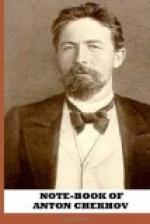September 14. Bayonne. Grande course landoise. Bull-fight.
September 22. From Biarritz to Nice via Toulouse.
September 23. Nice. I settled into the Pension Russe. Met Maxim Kovalevsky; lunched at his house at Beaulieu, with N.I. Yurassov and Yakobi, the artist. In Monte Carlo.
October 7. Confession of a spy.
October 9. I saw B.’s mother playing roulette. Unpleasant sight.
November 15. Monte Carlo. I saw how the croupier stole a louis d’or.
1898.
April 16. In Paris. Acquaintance with M.M. Antokolsky [sculptor] and negotiations for a statue of Peter the Great.
May 5. Returned home.
May 26. Sobolevsky came to Melikhovo. Must put down the fact that, in Paris, in spite of the rain and cold, I spent two or three weeks without being bored. Arrived here with M. Kovalevsky. Many interesting acquaintances: Paul Boyer, Art Roe, Bonnie, M. Dreyfus, De Roberti, Waliczewsky, Onieguin. Luncheons and dinners, at I.I. Schoukin’s house. Left by Nord-express for Petersburg, whence to Moscow. At home, found wonderful weather.
An example of clerical boorishness. At a dinner party the critic Protopopov came up to M. Kovalevsky, clinked glasses and said: “I drink to science, so long as it does no harm to the people.”
1901.
September 12. I was at L. Tolstoi’s.
December 7. Talked to L. Tolstoi over the telephone.
1903.
January 8. “Istorichesky Vestnik,” November 1902, “The Artistic Life of Moscow in the Seventies,” by I.N. Zakharin. It is said in that article that I sent in my “Three Sisters” to the Theatrical and Literary Committee. It is not true.
ANTON CHEKHOV’S NOTE-BOOKS
(1892-1904)
Mankind has conceived history as a series of battles; hitherto it has considered fighting as the main thing in life.
* * * * *
Solomon made a great mistake when he asked for wisdom.[1]
[Footnote 1: Among Chekhov’s papers the following monologue was found, written in his own hand:
Solomon (alone): Oh! how dark is life! No night, when I was a child, so terrified me by its darkness as does my invisible existence. Lord, to David my father thou gavest only the gift of harmonizing words and sounds, to sing and praise thee on strings, to lament sweetly, to make people weep or admire beauty; but why hast thou given me a meditative, sleepless, hungry mind? Like an insect born of the dust, I hide in darkness; and in fear and despair, all shaking and shivering, I see and hear in everything an invisible mystery. Why this morning? Why does the sun come out from behind the temple and gild the palm tree? Why this beauty of women? Where does the bird hurry, what is the meaning of its flight, if it and its young and the place to which it hastens




